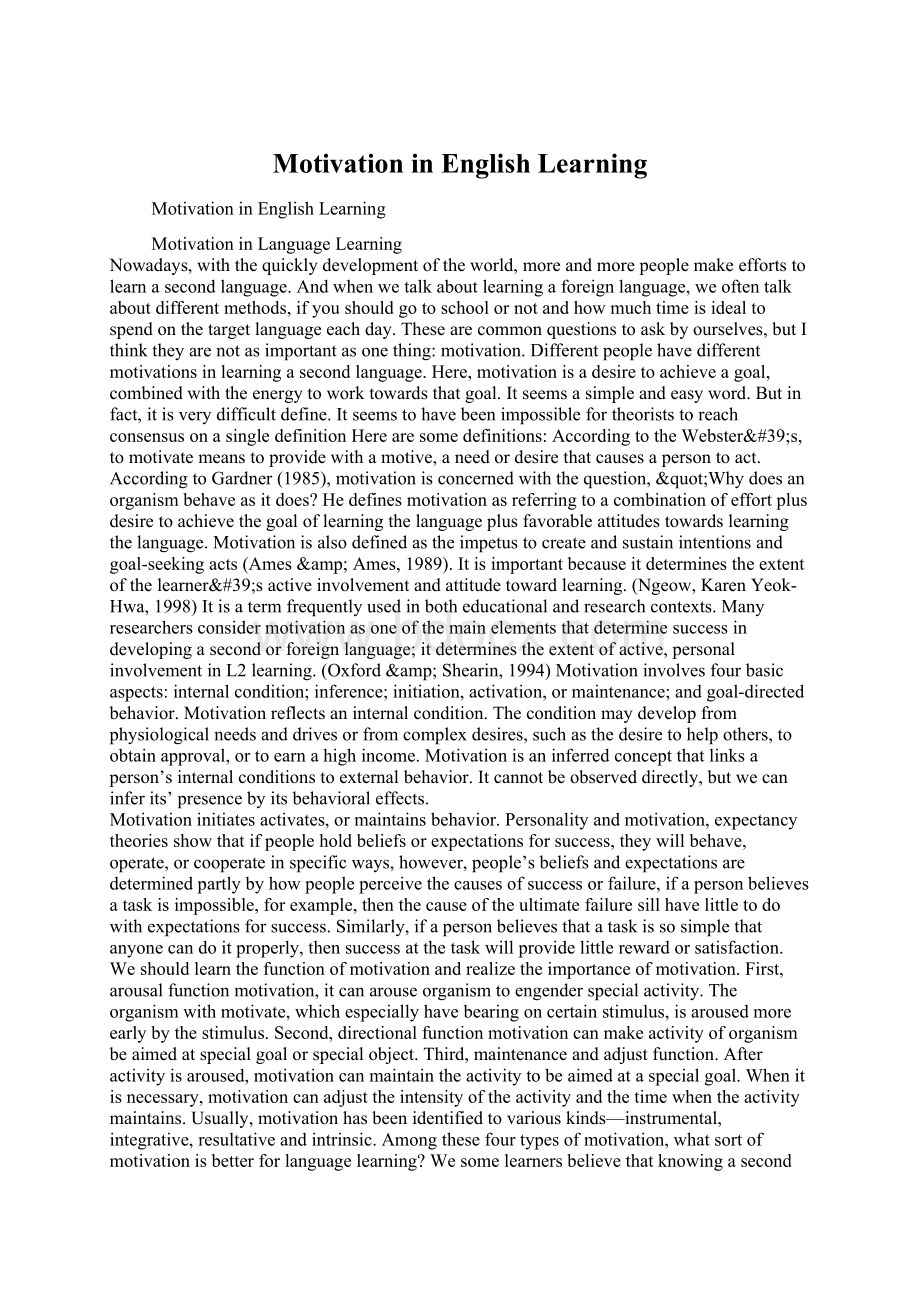 Motivation in English Learning.docx
Motivation in English Learning.docx
- 文档编号:4493894
- 上传时间:2022-12-01
- 格式:DOCX
- 页数:3
- 大小:17.53KB
Motivation in English Learning.docx
《Motivation in English Learning.docx》由会员分享,可在线阅读,更多相关《Motivation in English Learning.docx(3页珍藏版)》请在冰豆网上搜索。

MotivationinEnglishLearning
MotivationinEnglishLearning
MotivationinLanguageLearning
Nowadays,withthequicklydevelopmentoftheworld,moreandmorepeoplemakeeffortstolearnasecondlanguage.Andwhenwetalkaboutlearningaforeignlanguage,weoftentalkaboutdifferentmethods,ifyoushouldgotoschoolornotandhowmuchtimeisidealtospendonthetargetlanguageeachday.Thesearecommonquestionstoaskbyourselves,butIthinktheyarenotasimportantasonething:
motivation.Differentpeoplehavedifferentmotivationsinlearningasecondlanguage.Here,motivationisadesiretoachieveagoal,combinedwiththeenergytoworktowardsthatgoal.Itseemsasimpleandeasyword.Butinfact,itisverydifficultdefine.ItseemstohavebeenimpossiblefortheoriststoreachconsensusonasingledefinitionHerearesomedefinitions:
AccordingtotheWebster's,tomotivatemeanstoprovidewithamotive,aneedordesirethatcausesapersontoact.AccordingtoGardner(1985),motivationisconcernedwiththequestion,"Whydoesanorganismbehaveasitdoes?
Hedefinesmotivationasreferringtoacombinationofeffortplusdesiretoachievethegoaloflearningthelanguageplusfavorableattitudestowardslearningthelanguage.Motivationisalsodefinedastheimpetustocreateandsustainintentionsandgoal-seekingacts(Ames&Ames,1989).Itisimportantbecauseitdeterminestheextentofthelearner'sactiveinvolvementandattitudetowardlearning.(Ngeow,KarenYeok-Hwa,1998)Itisatermfrequentlyusedinbotheducationalandresearchcontexts.Manyresearchersconsidermotivationasoneofthemainelementsthatdeterminesuccessindevelopingasecondorforeignlanguage;itdeterminestheextentofactive,personalinvolvementinL2learning.(Oxford&Shearin,1994)Motivationinvolvesfourbasicaspects:
internalcondition;inference;initiation,activation,ormaintenance;andgoal-directedbehavior.Motivationreflectsaninternalcondition.Theconditionmaydevelopfromphysiologicalneedsanddrivesorfromcomplexdesires,suchasthedesiretohelpothers,toobtainapproval,ortoearnahighincome.Motivationisaninferredconceptthatlinksaperson’sinternalconditionstoexternalbehavior.Itcannotbeobserveddirectly,butwecaninferits’presencebyitsbehavioraleffects.
Motivationinitiatesactivates,ormaintainsbehavior.Personalityandmotivation,expectancytheoriesshowthatifpeopleholdbeliefsorexpectationsforsuccess,theywillbehave,operate,orcooperateinspecificways,however,people’sbeliefsandexpectationsaredeterminedpartlybyhowpeopleperceivethecausesofsuccessorfailure,ifapersonbelievesataskisimpossible,forexample,thenthecauseoftheultimatefailuresillhavelittletodowithexpectationsforsuccess.Similarly,ifapersonbelievesthatataskissosimplethatanyonecandoitproperly,thensuccessatthetaskwillprovidelittlerewardorsatisfaction.Weshouldlearnthefunctionofmotivationandrealizetheimportanceofmotivation.First,arousalfunctionmotivation,itcanarouseorganismtoengenderspecialactivity.Theorganismwithmotivate,whichespeciallyhavebearingoncertainstimulus,isarousedmoreearlybythestimulus.Second,directionalfunctionmotivationcanmakeactivityoforganismbeaimedatspecialgoalorspecialobject.Third,maintenanceandadjustfunction.Afteractivityisaroused,motivationcanmaintaintheactivitytobeaimedataspecialgoal.Whenitisnecessary,motivationcanadjusttheintensityoftheactivityandthetimewhentheactivitymaintains.Usually,motivationhasbeenidentifiedtovariouskinds—instrumental,integrative,resultativeandintrinsic.Amongthesefourtypesofmotivation,whatsortofmotivationisbetterforlanguagelearning?
Wesomelearnersbelievethatknowingasecondlanguagemayhelpgettingabetterjob,orgetaplaceatuniversity.AsurveyofyoungpeopleinEuropefoundthat29%wantedtolearnmorelanguagestoincreasetheircareerpossibilities,while14%wantedtheminordertolive,work,orstudyinthecountry.Thelastfigureisareminderthatinstrumentalandintegrativemotivationsareonetwoofthepossiblekindsofmotivation.Learnersmightlearnasecondlanguagewellwithaninstrumentalmotivationorwithanintegrativeone,orindeedwithbothatthesametime,orwithothermotivations.Definitely,secondlanguagelearningmotivationplaysanimportantroleintheprocessoflearners’learningsuccess.Weallknowthatmotivationisimportanttoourstudyonforeignlanguage.Butwealllookforwaystoimproveourlanguagelearning,weforgetourmotivation.We
trytomotivateourselvesformanythings,butsomehowweonlylookatmethodswhenlearningaforeignlanguage.Onlywhenyouaremotivated,youcanlearnaforeignlanguage.Whenyouarenotmotivated,youwon’tshowuptolearnyourtargetlanguage.So,Ithinkbeingmotivatedisthemostimportantthinginlanguagelearning.Itispossibletolearnmanythingsinashortamountoftime,buttotrulylearnalanguagetofluencyyouneedyearstoinput,studyandpractice.ZolttanDornyei,whotestedthemotivationoflearnersofEnglishinthetypicalEuropeansituationofHungary,foundthataninstrumentalmotivationconcernedwithfuturecareerswasverypowerful.Andintegrativemotivationbecamemoreimportantasthelearnersadvancedinthelanguage.Someresearchersindicatedthatthestrongerandclearermotivation,thehigheractiveinlearningandthemoreeffectiveitmaybe.However,somestudiesfoundthatmotivationgoesbothdirections.Learnerswhoexperiencesuccessinlearningmaybecomemore,orinsomecontexts,lessmotivatedtolearn.Ontheotherhand,forinstance,iflearnershaveachievedtheirtargets,thentheymayworkharderthanbeforeinordertoreachinganotherhighertarget.Inotherwords,highmotivationisonefactorthatcausessuccessfullearning;successfullearning,however,maycausehighmotivation.Thelatterprocessofcreatingsuccessfullearningwhichcanspurhighmotivationmaybeundertheteacher’scontrol,ifnottheformer.Ontheotherhand,forexample,theymayletthemselvesrelaxedforthinkingthattheyhaveachievedandtheydon’tneedtopaymoreeffortsitanymore.What’smore,Ausubelpointedoutthattherelationshipbetweenmotivationandlearningistypicallyinteractiveanditisnotjustaone-wayrelationship.Thatmeans,motivationpromptslearningbythewayofenhancingbehavior,andwhatlearnersgaincanincreasemotivation.So,weshouldsetagoal.Here,goalscanbedistinguishedintotwokind’sshorttermgoalsandlongtermgoals.Shorttermgoalsmayincludewantingtopassatermtestorfinishinganassignmentofaunitinabook.Whilelongtermgoalsmayhavesomethingtodowithawishtogetabetterjobinthefuture,oradesiretobepromoted,ortheabilitytoreadarticlesandbooksabouttheirmajorinEnglish.
Generallyspeaking,studentswithgoalsareusuallyeasytoteachthanthosewhohaven’t.Thenmotivationcanbeseparatedintoextrinsicmotivation,whichisconcernedthefactorsoutsidetheclassroom,andintrinsicmotivation,whichisconcernedwithwhattakesplaceinsidetheclassroom.Howtoimprovelearningmotivation?
Accordingtopsychologicalresearches,motivationisnotgenetic,itislearned.Inotherwords,motivationislearnableandteachable.Therearesomefactorsthataffectone’smotivation,suchasfamily,neighbors,priorteachers,learningconditionsandsoon.Theyarebeyondourcontrol.However,therearesomewaysthatcanchangeyourlearninghabitsandestablishyourmotivation.Herearesuggestions.1)Raiseone’slevelofconcern.Properlevelofconcerncanactivateone’sefforttolearn.Learnersshouldtakecareaboutwhattoleanandlearningresults,andhavearightattitudetowardlearning.Supposelearnersshowindifferenceorunconcerntotheirlearning,theywillmakenoorlittleprogressinlearning.Sowecansaynolearningwithoutconcern.2)Setlearninggoals.Settingagoaldemonstratesanintentiontoachieveandactivateslearningfromonedaytothenext.Italsodirectslearners’activitiestowardthegoalandoffersanopportunitytoexperiencesuccess.3)Acquirethesenseofsuccess.Successismoremotivatingthanfailure.Howtogainsuccess?
Normally,thematerialmustberelevant,andlearnerscanchooseproperactivitiesratherthanthosethataredifficult(littlelikelihoodofsuccess)oreasy(highprobabilityofsuccess).Passingatestorgettingarewardisasuccess.Everyminorsuccessistheprogresstowardgoals.Themoreyougetsuccesses,themoresatisfiedyouare,andtheharderyoulearn.Thisistheemotionalexperience.4)Showone’sinteresttolearning.Interestisthebestteacher.Twomethodscanbeused.First,trytofindinterestinglearningmaterials(differentpeople,differenttopics);second,trytoconnectyourlearningtorealisticlife(speaking,writing,andapplication).Wearriveattheconclusionthatitispossibleandfeasibletoimprovemotivationtolearninforeignlanguageteaching.Anditisnotedthatteacherdevelopthestudents’extrinsicmotivation,encouragetheirconvictionthattheyhavetolearnforeignlanguage,enhancestudents’self-confidenceinlearningforeignlanguage,
fostertheirdirectinterestinforeignlanguageandmakethemhaveacompetitioninlearningforeignlanguage.Theultimategoalofimprovingmotivationtolearnisthatthestudentsgraduallybecomeinitiativelearner.References:
张庆宗,《外语学与教的心理学原理》,外语教学与研究出版社,2011.Ames,C.1992.Classrooms:
goals,structuresandstudentmotivation.JournalofEducationalPsychology,84(3),261-71
- 配套讲稿:
如PPT文件的首页显示word图标,表示该PPT已包含配套word讲稿。双击word图标可打开word文档。
- 特殊限制:
部分文档作品中含有的国旗、国徽等图片,仅作为作品整体效果示例展示,禁止商用。设计者仅对作品中独创性部分享有著作权。
- 关 键 词:
- Motivation in English Learning
 冰豆网所有资源均是用户自行上传分享,仅供网友学习交流,未经上传用户书面授权,请勿作他用。
冰豆网所有资源均是用户自行上传分享,仅供网友学习交流,未经上传用户书面授权,请勿作他用。


 如何打造酒店企业文化2刘田江doc.docx
如何打造酒店企业文化2刘田江doc.docx
